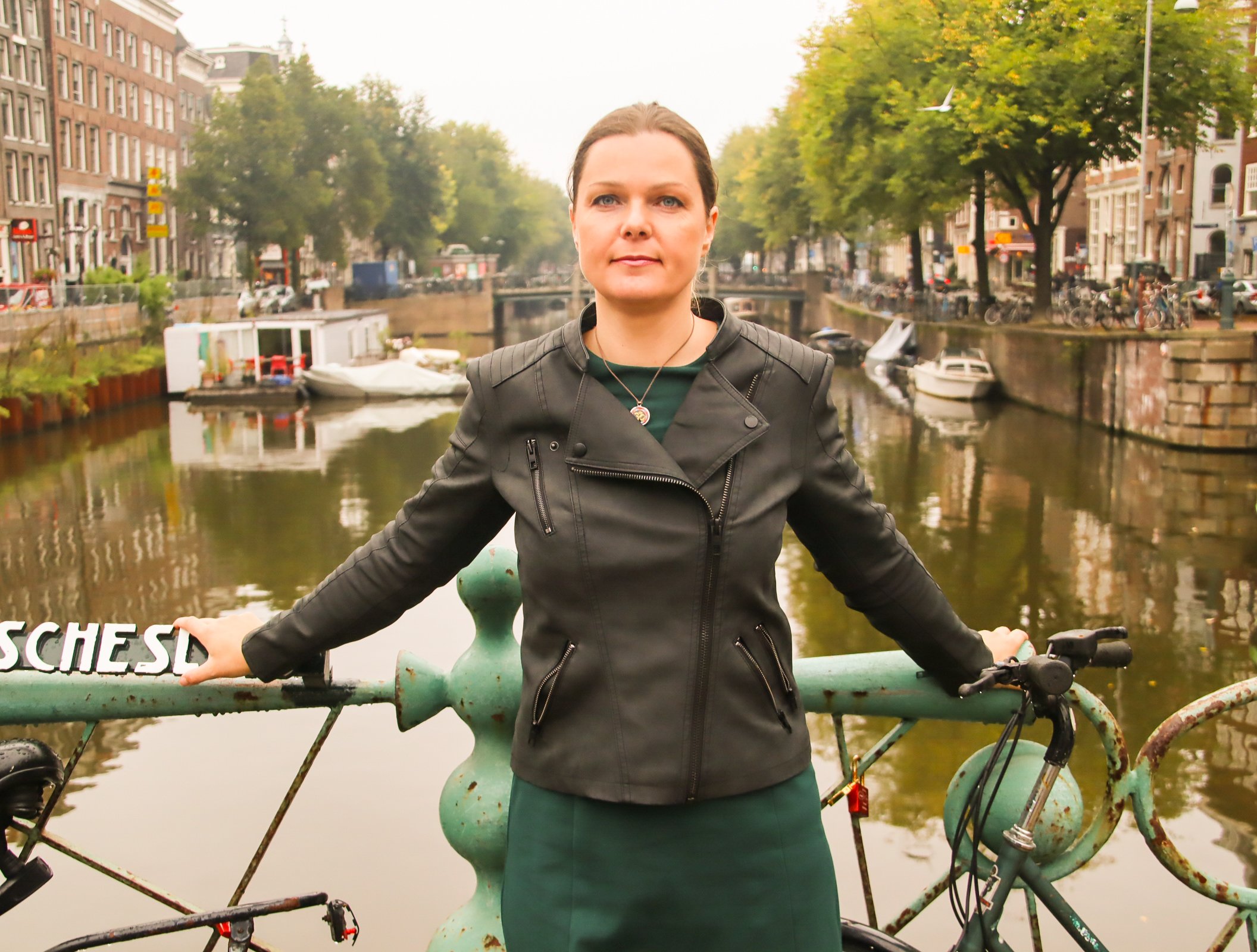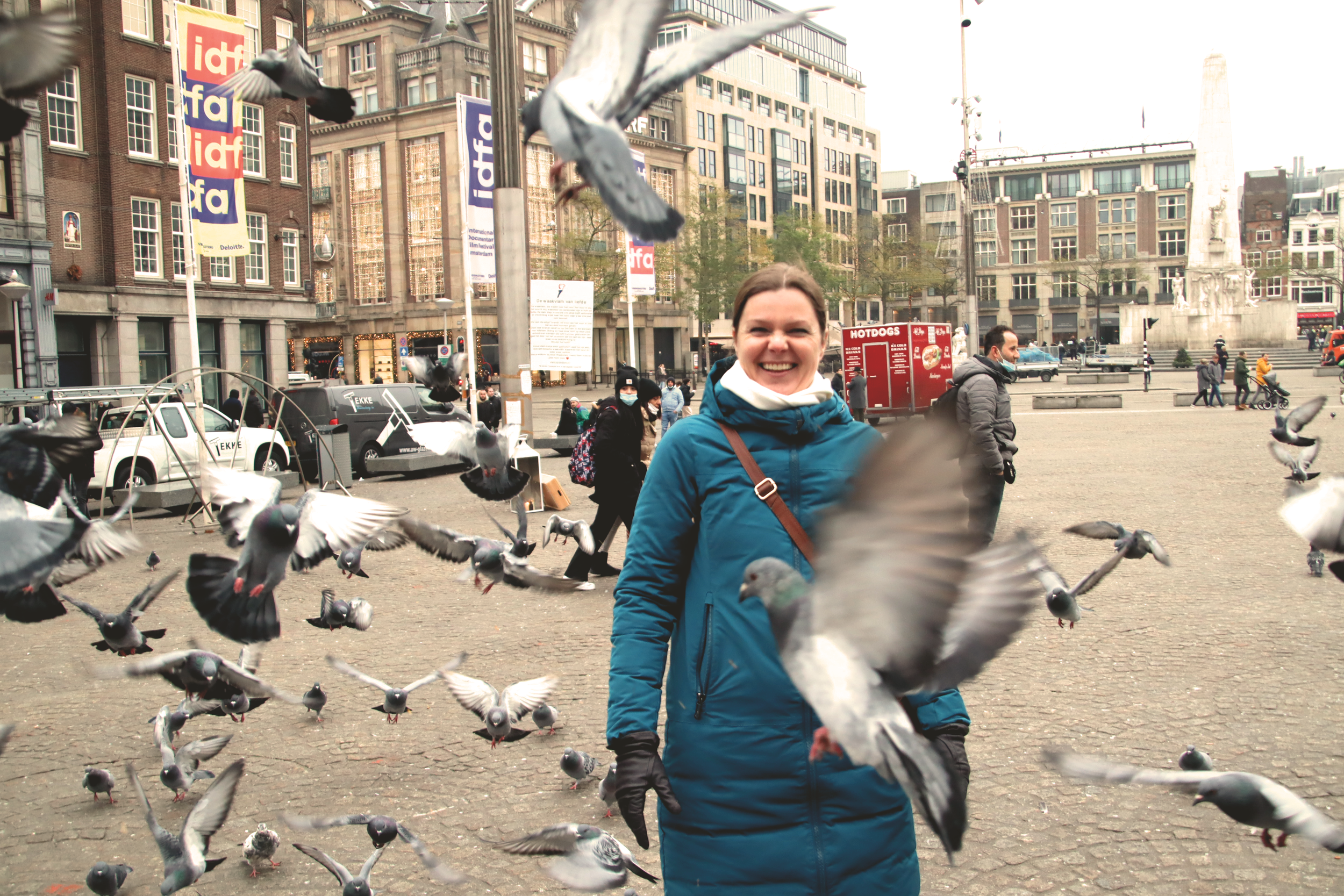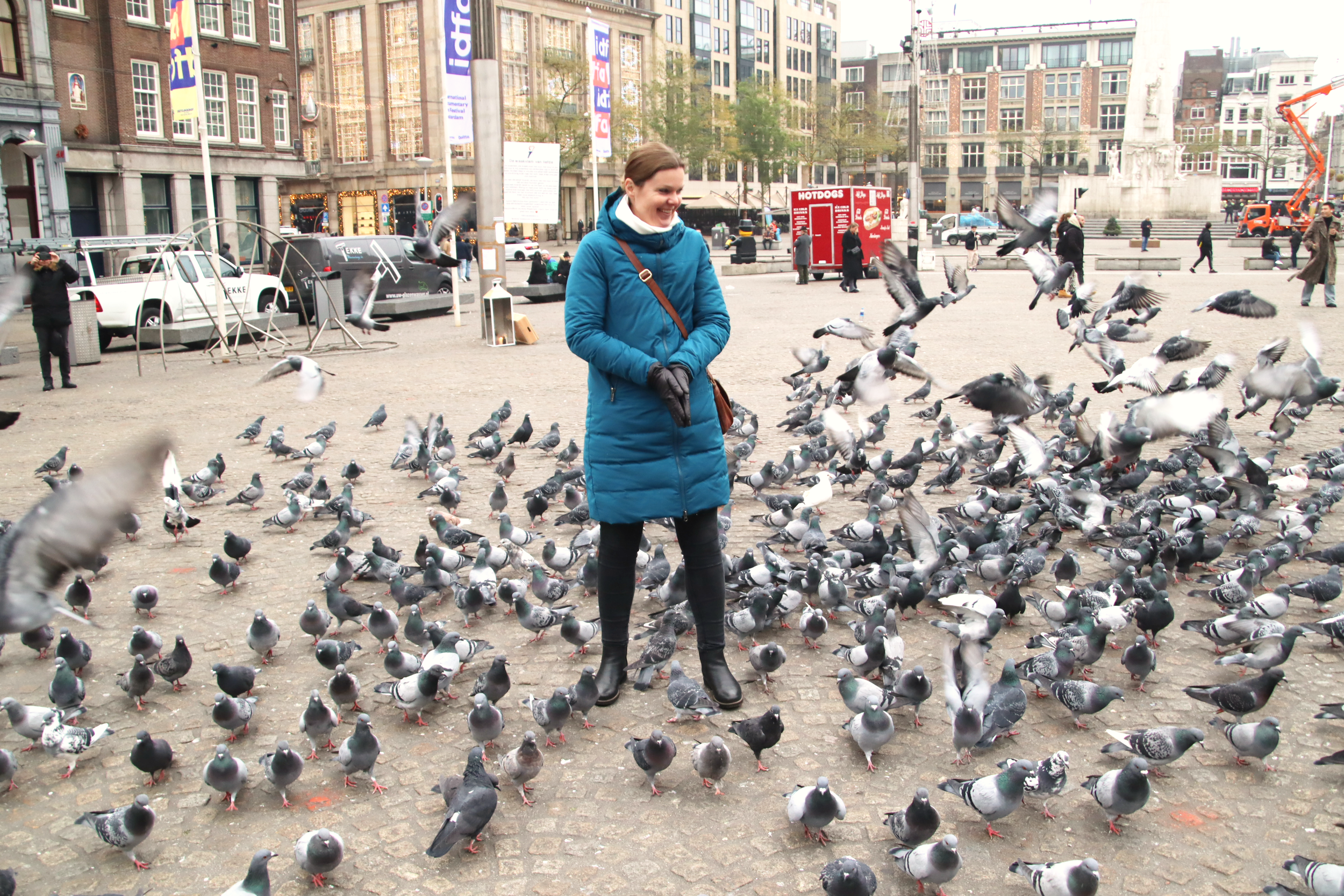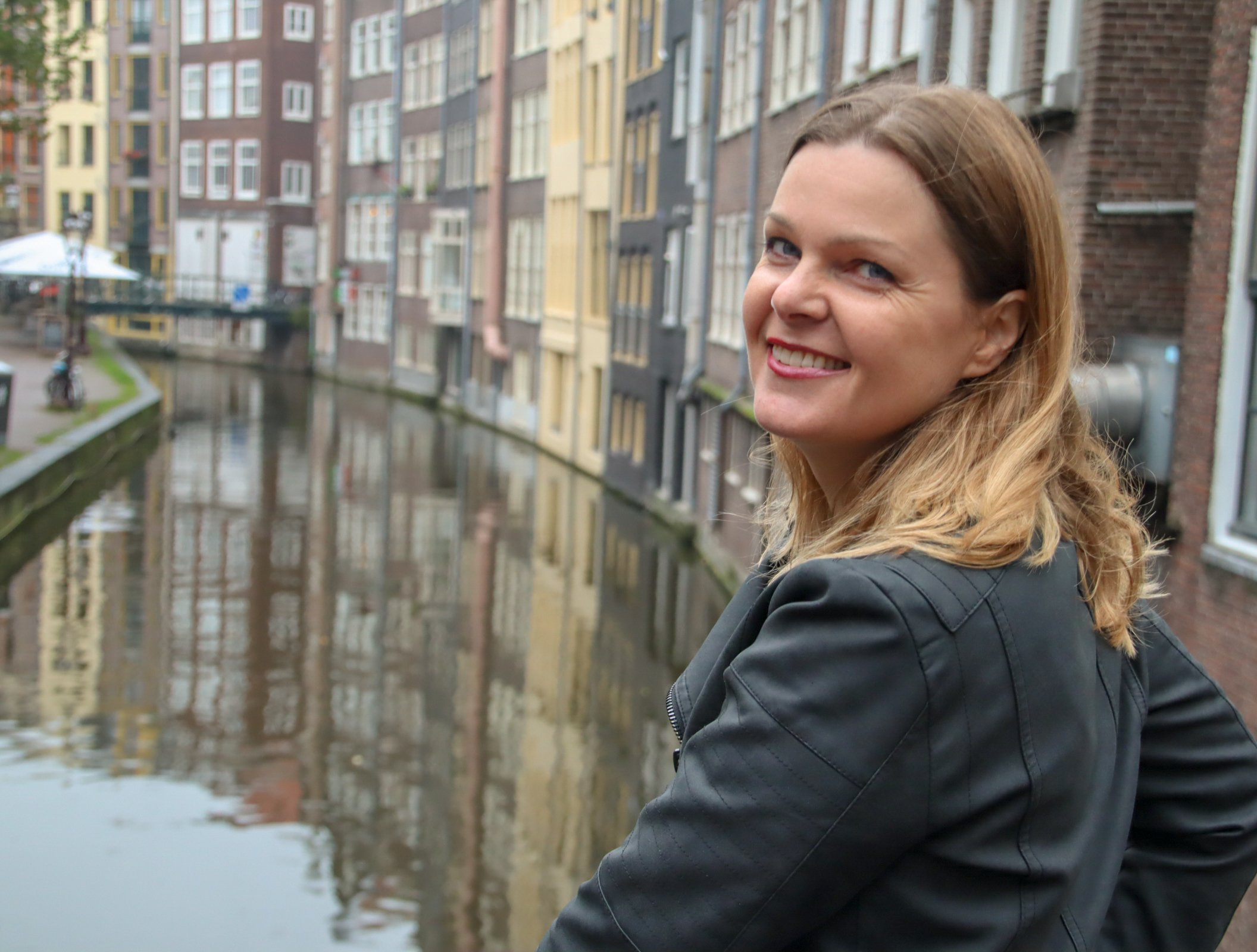Rasa Sagė: Nėra Vieno Teisingo Kelio (There isn’t Just One Correct Path)
Photography by Evelina Kvartunaite
All photos by E.Kvartunaite
Kaip pristatytumėte save?
Esu Homo Sapiens, viena iš 7,7 milijardų Žemės gyventojų, kurie gimsta ir miršta, o tame tarpe bando suprasti, kas jie tokie yra, iš kur atėjo, kur išeina ir kaip išvengti kančios būnant šiame kūne. Savo gyvenimą galėčiau suskirstyti į keturis etapus: tris kart po 7 metus, iki 21, kai gyvenau su tėvais ir pasaulis atrodė per didelis, nesuprantamas ir baisus; dukart po 7 metus, iki 35, kai ieškojau savęs ir išdrįsau patirti save įvairiose amplua; ir dar 7 metai, iki 42, kai tapau mama ir ėmiau rašyti knygas. Dabar, nuo 42 metų prasidėjo naujausias, laimingiausias mano gyvenimo etapas, jau turint patirties pagrindą po kojomis.
Kokia veikla užsiimate? Koks buvo jūsų karjeros kelias?
Šiuo metu auginu vaikus (Brigitai 8 – neri, Kasparui 6 -šeri) ir rašau knygas. Esu parašiusi tris romanus ir vieną knygą apie rašymą. Pirmasis mano romanas pasirodė 2017 m. ir vadinosi “Laimingi žmonės keliauja dviračiais“, antrasis – po dviejų metų ir vadinosi „Tavo likimo krašteliu einu“, ir trečiasis pasirodė šiais metais ir vadinasi „Burbulas. Apie pasaulį be vaikų“. Knyga apie rašymą išleista elektroniniu formatu ir vadinasi „Tiems, kurie svajoja parašyti knygą“.
Be rašymo aktyviai užsiimu visuomenine veikla, organizuoju literatūrinius renginius, su kolege įkūriau rašytojų bendruomenę „Lietuvių laisvalaikio literatūros lyga“, Nyderlandų skaitytojų klubą.
Kas jums svarbu asmeniniame gyvenime bei kas liečia karjerą? Kokias vertybes išskirtumėte?
Man labai svarbu tiek savo veikloje, tiek asmeniniame gyvenime rasti prasmę. Kaip rašė Viktor E. Frankl savo “must to read” knygoje “Žmogus ieško prasmės” – net koncentracijos stovykla įgauna kitą atspalvį, jei pamatai tame prasmę. Man labai svarbi kūrybinė laisvė ir abipusė pagarba, kuri negalima be emocinio intelekto. Sunku dirbti su žmonėmis, kurie linkę savintis (pavyzdžiui, kūrybinius rezultatus) ir stokoja komunikacinių, bendradarbiavimo įgūdžių. Tokių, beje, sutinku labai retai, nes dažniausiai visi mano sumanyti projektai sekasi sklandžiai, galbūt būtent dėl to, kad neskaičiuoju nei laiko, ne energijos, nes darau tai, ką labiausiai myliu.
Kokie keliai jus atvedė Nyderlandus? Kur gyvenote prieš tai?
Nyderlanduose esu jau antrą kartą. Nutiko labai smagi istorija. Mano gera vaikystės draugė, su kuria daug metų mokėmės vienoje klasėje, dar nepriklausomybės metų pradžioje nuvažiavo į Amsterdamą ir grįžusi visu balsu ėmė šaukti, kad tai būtent mano, tokios keistuolės menininkės, šalis. Nustebau, pasijuokiau, bet kažkodėl tas jos įtikinamas kalbėjimas įstrigo į širdį.
Pirmą kartą atvažiavau, kai užėjo pasaulinė krizė ir nusprendžiau porą metų pagyventi geriau ekonomiškai išsivysčiusioje šalyje, padirbėti ir pažinti kitą kultūrą. Po dviejų metų grįžusi į Lietuvą sutikau savo būsimą vyrą olandą, kurio nepažinojau gyvendama Nyderlanduose. Dar po ketverių metų gimė pirmasis mano romanas, pagrįstas tikra patirtimi Nyderlanduose “Laimingi žmonės keliauja dviračiais”. Po šešių metų gyvenimo Lietuvoje ir dviejų vaikų gimimo nusprendėme vėl atvykti ir įsikurti čia.
Kaip palygintumėte savo gyvenimo kokybę Lietuvoje su gyvenimu užsienyje?
Mes puikiai gyvenome Lietuvoje, lygiai taip pat puikiai gyvename Nyderlanduose. Kai susituokėme, nusipirkome kotedžą Vilniuje, kurį patys įsirengėme, ten gimė mūsų vaikai. Nyderlanduose taip pat nusipirkome namą, patys susiremontavome, įsikūrėme. Lietuva mane išmokė daugybės gerų dalykų - taupumo, praktiškumo, loginio mąstymo, planavimo, taip pat lankstumo, natūralumo, visi šie įgūdžiai labai praverčia Nyderlanduose. Čia mokausi šypsenų, malonaus bendravimo, tolerancijos, sportiškumo, grūdinimosi, taisyklių laikymosi, mandagumo. Labiausiai žavi pagarba vaikams ir malonus bendravimas, pagalba nepažįstamiems žmonėmis. Sunkiausia – gerai išmokti olandų kalbą, nes negyvenant Amsterdame be olandų kalbos “išgyventi” be galo sunku. Kone kasdieną nutinka po kuriozą, kai ko nors nesuprantu, nors visi kiti, atrodo, viską supranta, tik ne aš. Vieną kartą laiku nepasiėmiau vaiko iš baseino, nes buvo pakeista tėvelių laukimo vieta, kitą kartą atėjau į nėščiųjų jogą, trečią vos neįsigijau pensininkų laikraščio abonemento ir labai supykdžiau jauną pardavėją, nes galų gale supratau, ką ji man siūlo ir galiausiai atsisakiau. Nėra lengva, tačiau jau galėjau suprasti, kai gatvėje nepažįstamas žmogus mums su dukra pasiūlė atiduoti dėžę šviežutėlių pyragėlių, nes liko nuo kažkokios konferencijos. Gal ir nereikia imti pyragėlių iš nepažįstamųjų, tačiau čia visos tokios baimės ištirpsta nuoširdžioje žmogaus šypsenoje ir atvirame žvilgsnyje. Tikiuosi, teisingai supratau, ką man sako, ir paėmiau pyragėlius. Intensyviai mokausi olandų kalbos (turiu „taal coach“), einu į biblioteką, lankau aklo spausdinimo kursus, sportuoju su olandų grupe. Kasdien suprantu vis daugiau.
Ko pasiilgstate būdama Nyderlanduose?
Lietuviško maisto. O kai grįžtu į Lietuvą, tokio maisto norisi dvi – tris dienas, o vėliau jis tampa per riebus. Daugiau nieko nepasiilgstu, nes namai ten, kur šeima. Su tėvais bendraujame kaip ir visi, internetu, kartais atvažiuojame į Lietuvą. To užtenka.
Kaip pasikeitė požiūris į Lietuvą bei lietuvius, pradėjus gyventi užsienyje?
Nors išoriškai nedaug skiriasi, lietuviai yra žymiai švelnesnė tauta, nei olandai. Iš pirmo žvilgsnio taip gali nepasirodyti, nes olandai labai atviri ir draugiški, o lietuviams nesvetimas grubumas, tačiau įsigilinus į istoriją ir kultūrą paaiškėja, kad olandai atviri ir draugiški dėl to, kad yra be galo pragmatiški, prekybininkai, tyrinėtojai. Jų smalsumas sužadinamas tam, kad sužinotų kažką naujo ir galėtų panaudoti savo žinias. O lietuviai uždari, mėgsta būti gamtoje, prie žemės, prie savų. Toks būdas juos švelnina, jautrina, dažnai skaudina (kolektyvinės traumos). Olandai nėra jautrūs. Jų intelektas labai išvystytas, jie puikūs inžinieriai, keliautojai, taip pat jie turi labai aukštą emocinį intelektą, kuris būtinas sėkmingai prekybai. Tačiau jie, kaip ir minėjau, yra pragmatikai. Kuria taisykles ir jų laikosi, nes taip paprasčiau (ir pigiau). Jei pavadinti vaizdžiai: olandai yra nusausinta draugiškų pragmatikų tauta, o lietuviai – nukraujavusi geraširdžių niurgzlių tauta.
Kokios jūsų svajonės verčia jus judėti į priekį?
Turiu svajonių susijusių su kūryba, tačiau net jei neturėčiau, manau, kad vis tiek judėčiau į priekį. Man patinka kurti, patinka dirbti mylimą darbą, sužinoti naujų dalykų, bendrauti, todėl pats procesas yra svarbiau už rezultatą. Su vyru svajojame, kai vaikai užaugs, parduosime namą ir keliausime, keli mėnesiai bus vienoje šalyje, keli kitoje. Aš rašysiu, jis užsiims savo hobiais. Jei svajonė nepasikeis, gal taip ir bus.
Iš kur semiatės įkvėpimo?
Pirmiausia ateina idėja, kurią noriu įgyvendinti. Idėja būna labai šviežia, tačiau paskui tarsi savaime ima dėliotis dėlionė – perskaitytoje knygoje, pamatytame filme arba tiesiog pokalbyje su drauge nuolat randu ką nors ta tema. Kai pakankamai sukaupiu informacijos, sėdu kurti siužetą, ir kai jau turiu apie ką ir kokia bus knyga, imu rašyti. Jei gimsta renginio idėja – tiesiog imu ir darau. O idėjos dažniausiai gimsta iš bendravimo su žmonėmis. Gal dėl to man be galo patinka bendrauti.
Kokie keliai atvedė į Lietuvių bendruomenės veiklą? Jus taip pat plėtojate Knygų Klubo veiklą?
Dar prieš atvažiuojant gyventi į Nyderlandus žvalgiausi, kokie yra klubai, organizacijos, kokie lietuvių menininkai gyvena šioje šalyje. Susipažinau virtualiai, paskui ir gyvai su keliais nuostabiais žmonėmis, paskui suorganizavau Nyderlandų lietuvių menininkų prisistatymo renginį „Kūrybos galerija“, kuris vyko ambasadoje. Supratau, kad nėra tokio, kokio norėčiau knygų klubo, taigi įkūriau „Nyderlandų skaitytojų klubą“. Susitinkame kartą per mėnesį vieno iš klubo nario namuose, kalbamės apie perskaitytas knygas, keičiamės knygomis. Klubas jau turi ir savo biblioteką, taigi nei vienas dalyvis neišeina tuščiomis. Taip pat aktyviai dalyvauju bendruomenės veiklose, ambasados organizuojamose renginiuose, padedu organizuoti renginius. Man svarbu bendrauti su lietuviais, kurti bendruomenę, turėti bendraminčių, skleisti Lietuvos kultūrą.
Ką patartumėte žmonėms, kurie dvejoja dėl apsisprendimų, gyvenimo kelio pasirinkimų?
Jei žmogus abejoja, nežino, kuris kelias geriausias, reikia tiesiog palaukti ir surinkti daugiau informacijos. Galima paprašyti Visatos pagalbos priimti teisingiausią spendimą. Galima atsisukti į vaikystę ir pasižiūrėti ten, kokie dalykai būdavo natūralūs, priimtini, kokie ne. Klausytis, ką kužda širdis, nes ji žino geriausiai. Prieš vėją nepapūsi, kaip sako patarlė, taip ir prieš save negali nukreipti savo sprendimų, nes tada tiesiog visą laiką kažko trūks ir būsi nelaimingas. Aš anksčiau pavydėjau žmonėms, kurie nuo vaikystės žino, kuo nori būti. Pavyzdžiui, turėjau klasiokę, kuri nuo septintos klasės kalbėjo, kad bus dantistė. Ja ir tapo. Aš niekada nežinojau, kuo noriu būti. Dabar kai atsisuku atgal, suprantu, kad mane traukia grožis, spalvos, formos, taigi būčiau puiki grafikos dizainerė. Taip pat galėčiau būti laiminga būdama vaistininkė, nes man labai sekėsi chemija ir patinka vaistai, jų kvapas. Tačiau tapau rašytoja, o ši veikla man irgi be galo artima. Akivaizdu, kad nėra vieno teisingo kelio. Visi keliai geri, jei juos pasirinkus lydi geras jausmas.
Koks geriausias patarimas, kokį esate gavusi?
Priimk save tokią, kokia esi. Tu esi OK. Ir - niekada neuždaryk durų, nes gali tekti vėl pro jas užeiti.
Kokią Rasą norėtumėte matyti ateityje? Kurlink einate tuo keliu?
Žilą, išmintingą, populiarių knygų autorę. Viską ir darau, kad eičiau tuo keliu – nedažau plaukų, užsiimu saviugda ir intensyviai rašau😊😊
Nuoširžiai dėkoju jums už pokalbį ir linkiu sėkmės.
How would you introduce yourself?
I am Homo Sapiens -one out of 7,7 milliards of inhabitants of the Earth, who are born and die and somewhere in between they are trying to understand who they are, where did they come from and how to avoid suffering while inhabiting the current body. I could divide my life so far into four periods - three times of 7 years until I was 21, when I was living with my parents and the world looked too big, too difficult to understand and scary. Then two times of 7 until I turned 35 when I was searching for myself and allowed myself to experience myself in different amplua. And then one more time of 7 years until 42 when I became a mother and started writing books. And since I turned 42 my happiest period started, when I already have experience and stability.
What do you do? What is your career path?
I am currently raising kids (Brigita is 8 and Kaspar is 6 years old) and I write books. I have written three novels and one book about writing. My first novel was published in 2017 and is called “Happy People Travel by Bike”, second one - two years after that is called “A Bubble. About the World without Children”. A book about writing is only available digitally and is called “For those Who Dream to Write a Book”.
Besides writing I am also very involved in social work and volunteering, I organize events connected to literature, have co-founded a community for writers called “Lithuanian League of Leisure Literature” also Readers Club of the Netherlands.
What is important to you when it comes to private life and career? What are the most important values?
Both in my private life and in my career I find it very important to find the meaning. To quote Viktor E. Frankl in his must read book “Man’s Search for Meaning” - even concentration camp gets a different meaning if you see a meaning in that. I find my creative freedom to be a very important as well as mutual respect, which is not possible without emotional intellect. I find it difficult to work with people who tend to adopt (for example creative outcomes) and lack of communication and cooperation skills. Those people I dont meet very often which I am happy about and usually tend to work on successful projects. Thats perhaps because I don’t mind the time or energy that I pour into something I love doing.
How did you come to the Netherlands? Where did you live before that?
I am currently in the Netherlands for the second time in my life. It was a fun story actually. My good childhood friend who I also studied in highschool together with went to Amsterdam in the early years of Lithuanian independence. And she came back absolutely excited about how much she thought the city resonated with me and my personality. I was surprised by her statements but somehow it stayed with me.
I came for the first time when the global crisis hit and I decided to live in a better economically developed country for a couple of years, work and get to know another culture. After returning to Lithuania two years later, I met my future Dutch husband, whom I did not know while living in the Netherlands.
Four years later, my first novel, "Based on a real experience in the Netherlands, "Happy People Travel by Bike ", was born. After living in Lithuania for six years and having two children, we decided to come and settle here again.
How would you compare your life quality in Lithuania with the life quality you have here abroad?
We lived perfectly in Lithuania, we also lived perfectly well in the Netherlands. When we got married, we bought a home in Vilnius, which we designed ourselves, and our children were born there. In the Netherlands, we also bought a house, repaired it ourselves, and settled in. Lithuania has taught me many good things - economy, practicality, logical thinking, planning, as well as flexibility, authenticity, all these skills are very useful in the Netherlands.
Here I am learning to smile, enjoy communication, tolerance, practice sports, following the rules, and courtesy. The most fascinating thing is the respect for the children and pleasant communication, help for strangers. The most difficult thing is to learn Dutch well, because without living in Amsterdam, it is very difficult to "survive" without Dutch. Almost every day something funny happens when it comes to me not understanding something, even though everyone else seems to understand everything, just not me. One time I didn’t pick up my child from the swimming pool on time because they changed a waiting spot for the parents. Another time I came to a prenatal yoga class, the third - I almost subscribed to a newspaper for elderly.
It’s not easy, but I could already understand when a stranger on the street offered to give me a box of fresh cakes because they were left over from some sort of conference. Maybe it’s not the smartest thing to accept food from strangers but here all such fears dissolve into a sincere human smile. I study Dutch intensively (I have a “taal coach” - language coach), go to the library, attend blind printing courses, and play sports with a Dutch band. I understand more and more every day.
What do you miss while in the Netherlands?
I miss Lithuanian food. And when I am in Lithuania - I eat it only for a few days and it becomes too fatty. I dont miss anything else because home is where my family is. We communicate with my parents over the internet and when we visit Lithuania.
How did you view of Lithuania changed after you moved?
Although there is little difference externally, Lithuanians are a much milder nation compared to the Dutch. At a first glance, this may not be the case, because the Dutch are very open and friendly, where Lithuanians can be a bit rude. However, after looking closer at the history and culture, it turns out that the Dutch are open and friendly because they are extremely pragmatic, traders and researchers. Their curiosity has aroused in order to learn something new and be able to use their knowledge. Where Lithuanians are more closed, they like to be in nature, near the ground, near their loved ones. That softens, sensitizes and often hurts them (collective trauma). The Dutch are less sensitive. Their intellect is highly developed, they are excellent engineers, travelers, and they have a very high level of emotional intelligence, which is essential for successful trading. But they are, as I said, pragmatical. They create and follow the rules because it's easier (and cheaper). To say it maybe more poetically: the Dutch are a drained nation of friendly pragmatists, and the Lithuanians are a bloody nation of kind-hearted people.
What dreams inspire you to move forward?
My dreams are related to creativity, but even if I didn’t, I think I would still move forward. I like to create, I like to do the job I love, learn new things, communicate, so the process itself is more important than the result. With my husband we dream to sell the house and travel the world once the kids are grown up. I will write, he will pursue his hobbies. If the dream doesn’t change, maybe we will do that.
Where do you draw your inspiration from?
First comes the idea of something I want to realize. At first the idea is very fresh, but then, as if by itself, a puzzle begins to unfold - in a book I read, in a movie, or just in a conversation with a friend, I constantly find something connected to the topic. When I have enough information, I sit down to create a storyline, and when I already have a book about what and what it will be like, I start writing.
Most ideas are born from the communication with other people. Probably thats a reason I do enjoy communication.
How did you end up being involved in the Lithuanian Community work? How is the book club going?
Even before coming to live in the Netherlands I was interested in what kind of communities were present, what kind of organizations and what kind of artists lived here. I connected with some virtually and then some of them we met in person. Shortly after the arrival I also organized Lithuanian artists event “Gallery of Creativity” at the Lithuanian Embassy of the Netherlands in the Hague.
I realized that the book club I envisioned doesn't exist in the Netherlands so I founded a “Readers Club in the Netherlands” . We meet once a month at one of the club members' homes, talk about the books we have read, and exchange books. The club even has its own library so no one leaves the meeting empty handed. I am also actively involved in other activities, embassy events. It is very important to me to spend time with the Lithuanian people, to connect to the community, and to promote Lithuanian culture
What would you advise to the people who are doubting and have difficulties deciding about their life choices?
If a person is in doubt, and doesn't know which path to choose, it’s always good to stop and wait, to collect information. It’s also possible to ask for the support from the Universe to take the best decision. Or look back at the childhood events, what things were natural, reasonable and which were not.
It’s important to listen to the heart because it knows best. You can’t fight it. I was very envious of the people who knew what they wanted since they were very little. I had a classmate who knew she wanted to be a dentist since she was in the 7th grade. And she became a dentist. I never knew what I wanted to be. Only now when looking back I realize that I am attracted to beauty, colours, forms, I think I would be a great graphic designer. I would also like to be a pharmacist because I was really good at chemistry and I like the smell of medicine. However I became a writer and it’s something that makes me happy. It’s clear there is not a single path. All paths are good, especially if you have a good feeling traveling the one you chose.
Whats the best advice you ever got?
Accept yourself the way you are. You are OK. And - never close the door - you never know when you will have to revisit them again.
How do you see yourself in the future? Whats leading you there?
Grey and wise popular booth author. I am doing everything I can to get there - I don’t die my hair, focus on personal development and write a lot.
Thank you for the conversation and all the best to you!



